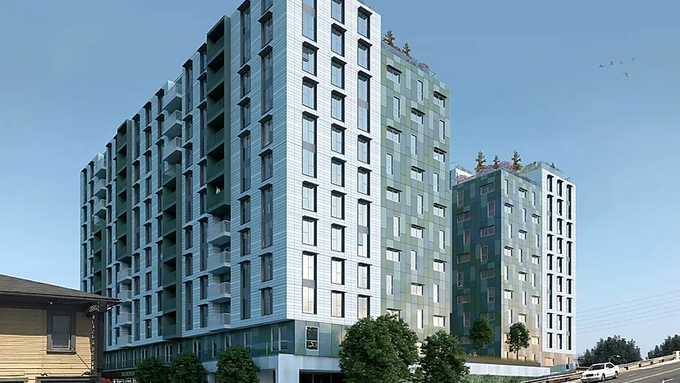
The McEvoy Apartments in San Jose are one example of a recent affordable housing win. Image courtesy First Community Housing
Elected officials and business groups from across the San Francisco Bay Area are proposing a dual measure for the November ballot to “ raise sales taxes across the nine [Bay Area] counties by 1 percent, generating $100 billion over 40 years to split between housing and transportation,” according to the San Francisco Chronicle.
Two separate housing and transportation measures are being combined to deal with a problem California officials have faced since the enactment of Prop. 13 in 1978: How to carefully craft ballot measures in order to receive the necessary two-thirds voter approval under the law for special taxes.
The Chronicle’s Rachel Swan notes that recent opinion polling had shown that voters are sometimes loath to approve two side-by-side taxes, necessitating the combined measure.
The transportation measure, called FASTER Bay Area, would have raised $100 billion for 40 years through a sales tax increase. The second measure, known as Bay Area Housing for All, would have provided $10 billion through a general obligation bond.
Officials including San Jose Mayor Sam Liccardo also say that housing and transportation are linked.
“The public is increasingly getting the fact that these two issues are inextricable,” Liccardo told San Jose Spotlight. “The fact that their coworker is commuting 90 minutes every morning and night is linked to the fact that the same coworker can’t afford a home in our valley. We need to tackle both challenges together or we will fail at both.”
Some transportation advocates have agreed with this kind of reasoning. The Silicon Valley Bicycle Coalition stated on its website that it recognized housing was critical.
“As housing costs continue to rise, people move farther and farther away to afford a place to live, and it becomes harder and harder for them to bike to work and to other critical destinations,” the bicycle coalition noted, adding that it was working with others in the region to address the issue.
Much work remains for the measure, with the Chronicle noting that the idea of a combined ballot measure “would require state legislation to grant taxing authority to a regional agency,” with two-thirds approval needed from both the state Assembly and state Senate before summer recess. The Metropolitan Transportation Commission would also need to sign off on the plan “before the campaign can draft ballot language in August,” the paper added.
Some, such as Voices for Public Transportation member Bob Allen, have expressed skepticism about the plan. “I think this is a very risky proposition,” Allen told the Chronicle. I think you can make a case that housing and transportation are inextricably linked, and I would love to do that. But you don’t do it off the cuff in February with no plan.”
Still, stakeholders are hopeful.
“The hardest part is there are a lot of hard parts to come,” Silicon Valley Leadership Group CEO Carl Guardino told the Spotlight. “The easier part is we’re all adults who are equally concerned about solving these issues to strengthen the Bay Area for 8 million people and that’s why I’m optimistic.”
Short articles summarizing reporting by local news sources with linkbacks to the original content.